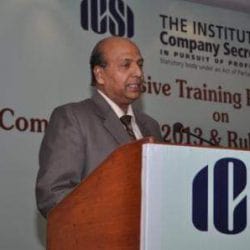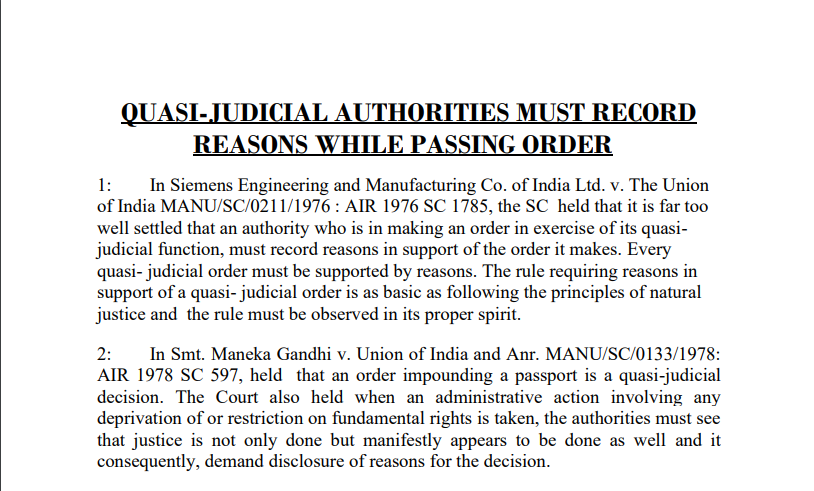Quasi-Judicial Authorities Must Record Reasons While Passing Order
Quasi-Judicial Authorities Must Record Reasons While Passing Order
1: Siemens Engineering and Manufacturing Co. of India Ltd. v. The Union of India MANU/SC/0211/1976: AIR 1976 SC 1785, the SC held that it is far too well settled that an authority who is in making an order in exercise of its quasi-judicial function, must record reasons in support of the order it makes. Every quasi-judicial order must be supported by reasons. The rule requiring reasons in support of a quasi-judicial order is as basic as following the principles of natural justice and the rule must be observed in its proper spirit.
2: In Smt. Maneka Gandhi v. Union of India and Anr. MANU/SC/0133/1978: AIR 1978 SC 597, held that an order impounding a passport is a quasi-judicial decision. The Court also held when an administrative action involving any deprivation of or restriction on fundamental rights is taken, the authorities must see that justice is not only done but manifestly appears to be done as well and it consequently, demands disclosure of reasons for the decision.
3. In Rama Varma Bharathan Thampuran v. State of Kerala and Ors. MANU/SC/0514/1979: AIR 1979 SC 1918, SC held that the functioning of the Board was quasi-judicial in character. One of the attributes of quasi-judicial functioning is the recording of reasons in support of decisions taken and the other requirement is following the principles of natural justice and it requires reasons to be written for the conclusions made.
4: In Gurdial Singh Fijji v. State of Punjab and Ors. MANU/SC/0455/1979: (1979) 2 SCC 368, the Supreme Court, dealing with a service matter, held that “rubber-stamp reason” is not enough and that reasons “are the links between the materials on which certain conclusions are based and the actual conclusions.”.
5: In a Constitution Bench decision of SC in Shri Swamiji of Shri Admar Mutt Vs. The Commissioner, MANU/SC/0509/1979: AIR 1980 SC, has observed “ Reason is the soul of the law, and when the reason of any particular law ceases, so does the law itself”.
6: In M/s. Bombay Oil Industries Pvt. Ltd. v. Union of India and Ors. MANU/SC/0270/1983: AIR 1984 SC 160, this Court held that while disposing of applications under Monopolies and Restrictive Trade Practices Act the duty of the Government is to give reasons for its order and faith of the people in administrative tribunals can be sustained only if the tribunals act fairly and dispose of the matters before them by well-considered orders.
7: In Ram Chander v. UIO MANU/SC/0484/1986: AIR 1986 SC 1173, the SC was dealing with the appellate provisions under the Railway Servants (Discipline and Appeal) Rules, 1968 condemned the mechanical way of dismissal of the appeal in the context of the requirement of Rule 22(2) of the aforesaid Rule. This Court held that the word “consider” occurring to Rule 22(2) must mean the Railway Board shall duly apply its mind and give reasons for its decision. The learned Judges held that the duty to give a reason is an incident of the judicial process and emphasized that in discharging quasi-judicial functions, the appellate authority must act in accordance with natural justice and give reasons for its decision.
8. In Maharashtra State Board of Secondary and Higher Secondary Education v. K.S. Gandhi, MANU/SC/0583/1991:(1991) 2 SCC 716, even in domestic inquiry if the facts are not in dispute, non-recording of the reason may not be violative of the principles of natural justice but where facts are disputed, necessarily the authority or the inquiry officer, on consideration of the materials on record, should record reasons in support of the conclusion reached.
9: In M.L. Jaggi v. Mahanagar Telephones Nigam Limited and Ors. MANU/SC/0625/1996: (1996) 3 SCC 119, Court dealt with an award under Section 7 of the Telegraph Act and held that since the said award affects the public interest, reasons must be recorded in the award so that such reasons are to be recorded, enables the High Court to exercise its power of judicial review on the validity of the award.
10: In Charan Singh v. Healing Touch Hospital and Ors. MANU/SC/0588/2000MANU/SC/0588/2000: AIR 2000 SC 3138, a three-Judge Bench of this Court, dealing with a grievance under CP Act, held that the authorities under the Act exercise quasi-judicial powers for redressal of consumer disputes and it is, therefore, imperative that such a body should arrive at conclusions based on reasons. This Court held that the said Act is one of the benevolent pieces of legislation, is intended to protect a large body of consumers from exploitation as the said Act provides for an alternative mode for consumer justice by the process of a summary trial. The powers which are exercised are definitely quasi-judicial in nature and in such a situation the conclusions must be based on reasons and held that the requirement of recording reasons is “too obvious to be reiterated and needs no emphasizing”.
Read the copy:
 Advocate Pradeep Kumar
Advocate Pradeep Kumar
PK Mittal BCom Delhi university 1975 LLB Delhi University 1978 FCS Fellow Member of ICSI 1992 1982 to 1992 as CS in Corporate Head Legal Apollo Tyres Ltd 1986 to 1992 1993 onwards Advocate in Delhi High Court CESTAT NCLT = Practcising Indirect Tax and Corporate laws 1993 to till date. Written more than 100 Article on Company Law and Corporate laws Indirect Tax Speaker on Indirect Tax Co Law and IBC in various Seminars Workshop organised by ICAI ICSI and ICMA and other organisations Convenor Core Group on GST of ICSI








